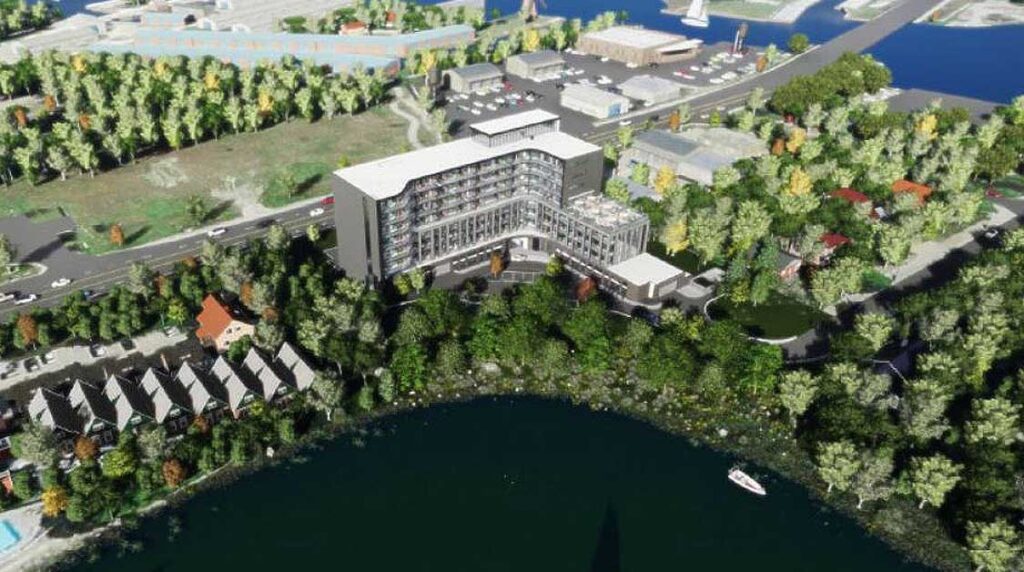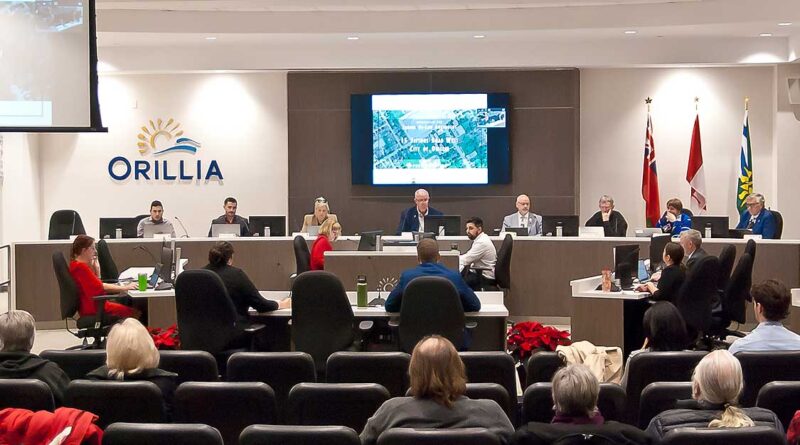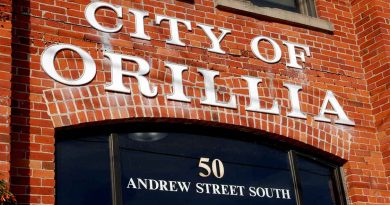Council Preview
By John Swartz
Orillia council’s 2 p.m. Monday meeting begins by recognizing June is National Indigenous History Month. The meeting will start with the Mnjikaning Kendaaswin Elementary School Choir and Girls’ Hand Drum Group singing the National Anthem and a song written by Lorraine McRae. Then Ben Cousineau and James Simcoe representing the Chippewas of Rama First Nation will be on hand for the reading of the Land Acknowledgment.
There are no deputations, but there is an item under the presentation header, which is listed as Mayor Don McIsaac. There is no accompanying documentation regarding the presentation.
After the public forum council will have a closed session with four items on it. One is regarding the contract with the IBEW environment and infrastructure services unit.

Next, council will get information about the appeal of council’s decision regarding 643 Atherley Road and 642 Driftwood Road the developers of made to the Ontario Land Tribunal. Council will hear details of a Proposed Minutes of Settlement. The developer is proposing a condominium on the shores of Lake Simcoe that exceeds the zoning limitations tremendously. It’s also proposed to build a parking lot for 50% capacity more than zoning requires – right next to the lake. Last December council told the developer to come back with some changes to their application.
Council will also receive details on the sale of land in the Horne Business Park and information about another property the City is interested in buying.
Housing
When council returns to the public meeting, Mayor McIsaac and councillors Janet-Lynne Durnford and Jay Fallis have a report about increasing the annual contribution to the affordable housing reserve.
They would like the contribution increased by $250K to $575K. They state they are aware of several proposals for affordable housing that are being developed for presentation to the City.
Failed policy at the federal and provincial levels has pushed this issue onto municipalities which are least able to come up with the resources to stem a dearth of decent housing people can afford. In other words, the investment is needed, but it’s hardly enough.
In the 2024 budget council increased the contribution by $100K for a total of $425K, but that extra amount was not approved for subsequent years. This report wants to make the $250K increase apply to budgets through to 2028.
Council used $100K from the reserve recently to help cover cost for the new Temporary Supportive Rapid Re-Housing Program located on West Street next to the Orillia Recreation Centre.
The City also hopes to have some contributions come in shortly from the City-Wide Garage Sale on June 15. The current value of the reserve account is $699,576. The motion asks council to forward the budget increase to the 2025 budget.
Other Reports
The next report from staff responds to a council request about feasibility and costs of establishing community safety zones on Bass Lake Side Road and on the length of Stone Ridge Boulevard from the intersection at University Avenue the intersection with Orion Boulevard.
Staff says neither location meets the requirements of the Ontario Traffic Manual regarding the number of accidents recorded nor a study of speeds observed that necessitates a change. Staff also says there is nothing special about the roads that would dictate considering a lower speed and higher fines.
The next report also relates to traffic. Last June council asked staff to report on the options, opportunities and effect of revising Appendix C of the City’s Traffic Calming Policy in order to make the criteria for designation more lenient and to reduce the minimum requirements.
Staff recommend no changes to current policy. They did note that Kingston has a program in which each councillor gets to select a road once a year for speed reduction changes. Of course this would become a purely political function rather than an analysis of what is actually going on and whether alterations would change anything. Staff included this as a third option, but also attached a $120K budget to buy things like speed bumps, and $15,000 per ward for installation and winter removal.
The second option is to reduce the minimum thresholds for consideration of reducing speeds in specific areas.
Show Us The Money

The City’s treasurer, John Henry, has a report on the results of the 2024 fiscal year. Typically council is working with projections for devising annual budgets because some accounts do not get settled by December 31, (e.g. the Simcoe Muskoka District Health Unit only just recently notified the City of its financial requirements for 2024).
This time of year there is little doubt budget projections from the previous year hit their marks. As it turns out, the City had a surplus of $3.2 million on its investments over budget, and $4.3 million savings from various other spending projections, of which salaries was the largest contributor to the surplus.
The City also had a surplus from its water and waste water operations of approximately $1.8 million. This was due to higher usage of water, and higher fees collected from commercial users on the waste water side, both combined with lower expense than budgeted.
Storm Sewer costs on the other hand generated a $150K deficit. Staff overestimated the amount of revenue, which was somewhat offset by a reduction in operating costs.
For capital projects, which normally include projects unfinished from previous budget years, the City did not spend $9.2 million budgeted for 285 projects at $91.9 million. That money was earmarked in large from various reserved accounts and the surpluses will be returned to the reserves.
Of the capital projects completed in 2023, it’s interesting to note the council chamber redo cost $926K and they managed to not install enough lighting on the councillors for video purposes, or put in enough speakers in the chambers and tune the audio properly.
And despite a $21 million deficit in the development charges reserve the City has an $86 million positive balance of all reserve accounts, not counting the Legacy Fund (sale of Orillia Power distribution proceeds). The new balance is $27 million higher than in 2022.
Some of the highlights from operating surpluses include $47,000 more from the Opera House seat tax. That is a flat $1.50 per ticket which means more than 30,000 tickets were sold to events than budgeted.
The municipal accommodation tax resulted in a $138K surplus over budget, which means more people visited us than expected. On the scratching our heads side, the snow removal budget was under spent by $26,000, for one of the least snowy winters this writer experienced in 35 years.
Also included in the report is mention of approving capital projects for 2024. This is a formality since approvals were given at budget. The motion also includes cancellation of several capital projects valued at just short of $3 million. Extending Neywash Street to Lightfoot Drive and a watermain replacement for Esther Anne, Karen and Charles Streets won’t be happening.
Motions
It’s time for the annual cheque passing from Orillia Power Generation to the City. There are two payments made annually. This one is the dividend to the shareholders, of which the City is the only one, of $1 million. This is separate from the interest payment the City receives each December on a promissory note given when OPG was set up.
Councillors Tim Lauer and Durnford have a Notice of Motion they will bring a motion June 17 to waive policy in order to install immediately temporary four-way stops at the intersections of Brant Street and Canice Street, and at Tecumseth Street and Lightfoot Drive.
Council meetings are open to the public or can be watched on the City’s Youtube channel.
Council meetings are open to the public or can be watched on the City’s Youtube channel.
(Photos by Swartz – SUNonline/Orillia)




